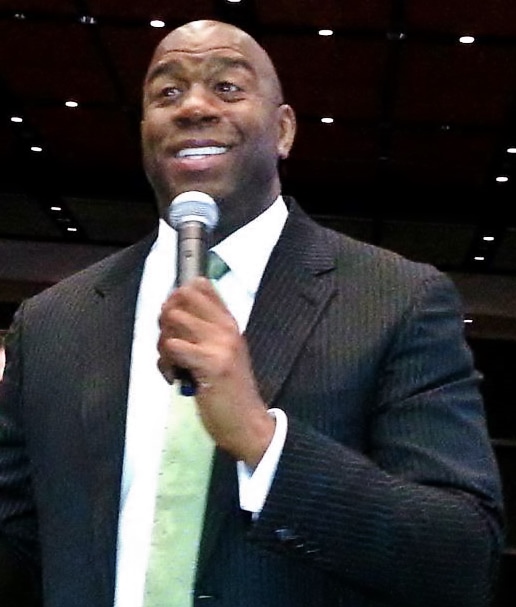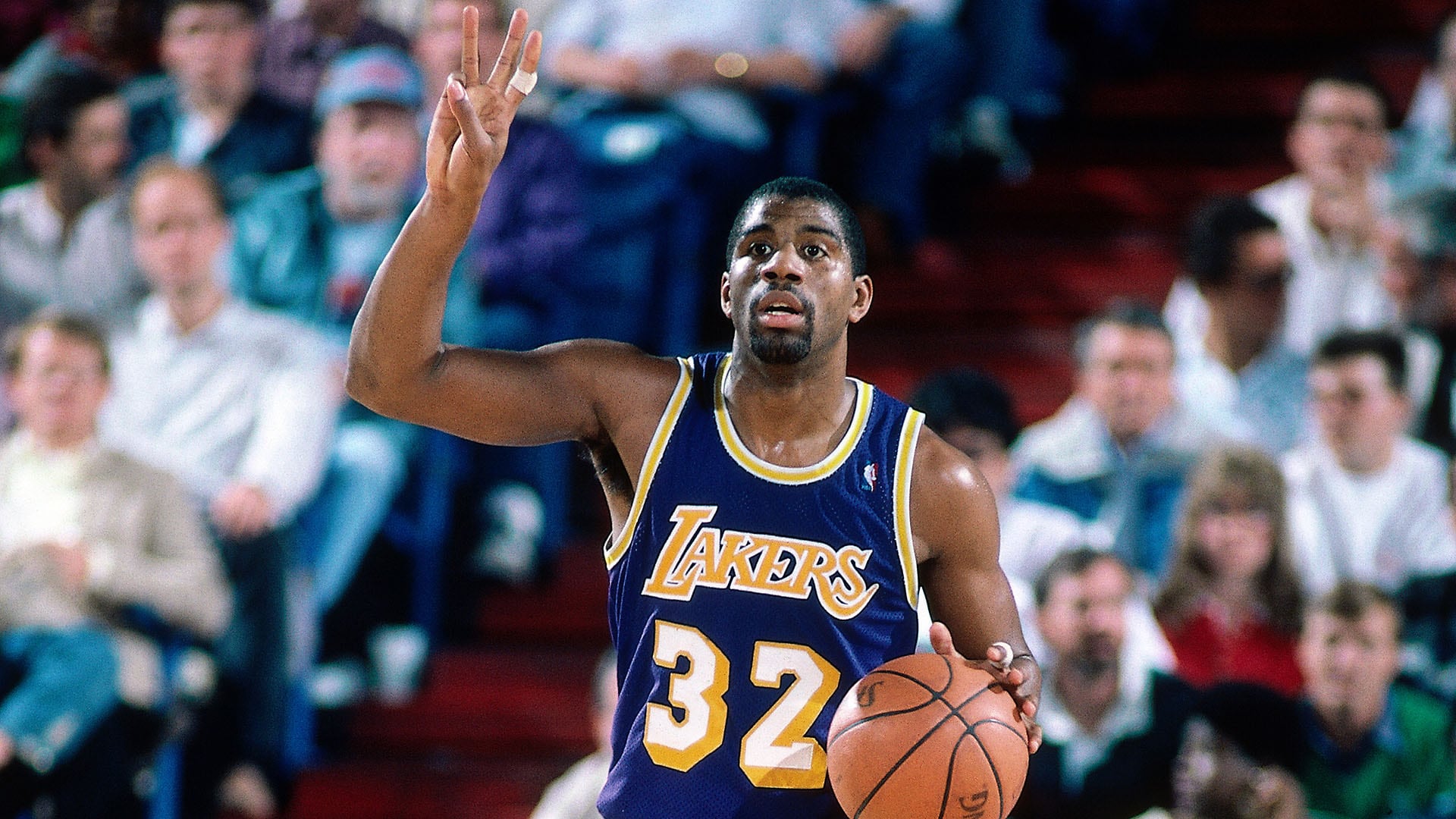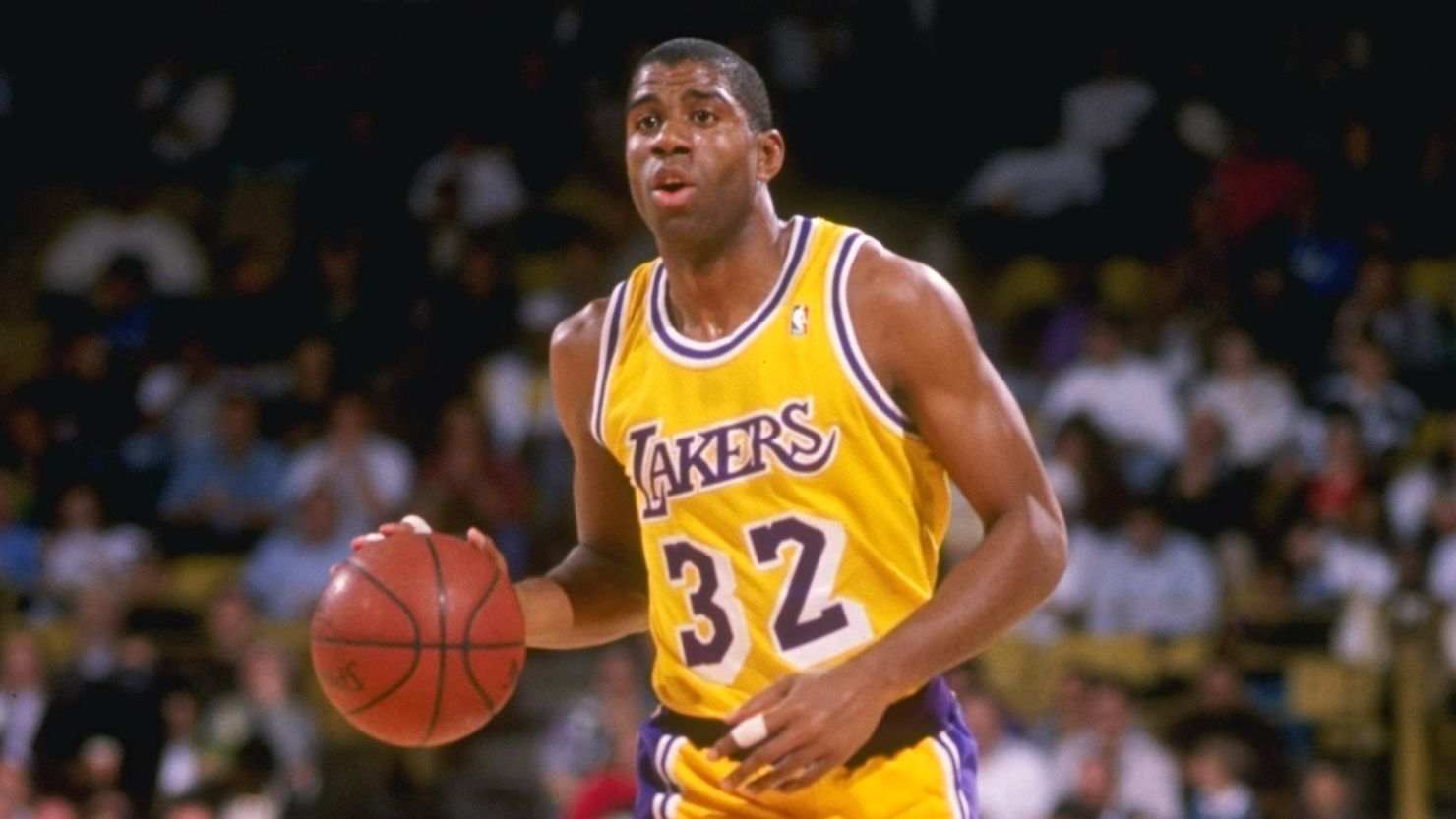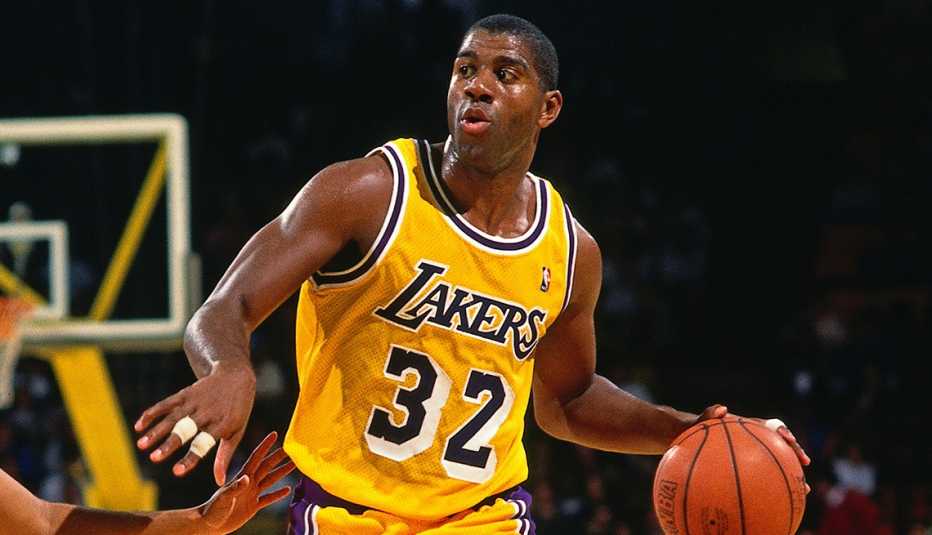Magic Johnson (Part 2)
Magic Johnson (Part 2)

Earvin "Magic" Johnson's decision to attend Michigan State University was influenced by his desire to play close to home and the opportunity presented by coach Jud Heathcote to play the point guard position. Despite being recruited by several top-ranked colleges, including Indiana and UCLA, Johnson ultimately chose Michigan State over Michigan in East Lansing.
During his freshman year at Michigan State, Johnson made an immediate impact, averaging 17.0 points, 7.9 rebounds, and 7.4 assists per game. He played alongside future NBA draftees Greg Kelser, Jay Vincent, and Mike Brkovich, leading the Spartans to a remarkable 25–5 record, the Big Ten Conference title, and a berth in the 1978 NCAA tournament. Although they fell short in the Elite Eight, their success laid the foundation for Johnson's illustrious college career.
The following season, Johnson continued to excel, guiding Michigan State to the NCAA championship game against Indiana State, led by senior Larry Bird. In what became the most-watched college basketball game ever, Michigan State emerged victorious with a 75–64 win, and Johnson was named the Most Outstanding Player of the Final Four. His stellar performance earned him a spot on the 1978–79 All-American team.
After two successful years in college, during which he averaged 17.1 points, 7.6 rebounds, and 7.9 assists per game, Johnson declared for the 1979 NBA draft, marking the end of his collegiate career. However, his ties to Michigan State remained strong, as evidenced by his participation in the Jud Heathcote All-Star Tribute Game in 1995, where he led all scorers with 39 points, paying tribute to his former coach.
Earvin "Magic" Johnson's entry into the NBA with the Los Angeles Lakers in 1979 marked the beginning of a legendary career. Drafted first overall, Johnson joined a Lakers team led by Kareem Abdul-Jabbar, who was already established as one of the greatest players in NBA history. Johnson expressed excitement about the opportunity to play alongside Abdul-Jabbar and help the Lakers secure an elusive championship.
Despite some skepticism about his role as a 6-foot-9-inch rookie, Johnson was assigned the point guard position by Lakers coach Jack McKinney. Despite the presence of Norm Nixon, an established point guard, Johnson embraced his new role and delivered impressive performances throughout the season. He averaged 18.0 points, 7.7 rebounds, and 7.3 assists per game, earning a spot on the NBA All-Rookie Team and a starting position in the NBA All-Star Game.
During the 1979-1980 season, the Lakers compiled an impressive 60–22 record and advanced to the NBA Finals, where they faced the Philadelphia 76ers, led by Julius Erving. In Game 5 of the series, Abdul-Jabbar suffered a sprained ankle, forcing him to sit out Game 6. In a bold move, Lakers coach Paul Westhead started Johnson at center for Game 6. Johnson responded with a historic performance, recording 42 points, 15 rebounds, 7 assists, and 3 steals as the Lakers secured a decisive 123–107 victory. His versatility and leadership on the court earned him the NBA Finals MVP award, making him the only rookie to achieve this feat.
Johnson's remarkable performance in Game 6 of the NBA Finals solidified his reputation as one of the greatest players in NBA history. His ability to step up in crucial moments and deliver under pressure remains a defining moment in NBA lore, and he joined a select group of players to win both NCAA and NBA championships in consecutive years.
After an injury-ridden start to the 1980–81 season, Johnson faced a challenging period of rehabilitation. Missing 45 games due to torn cartilage in his left knee, he described this time as one of the lowest points in his career. Despite his absence, the Lakers entered the playoffs with high expectations. However, Johnson's return before the postseason created tension within the team, as noted by then-assistant coach Pat Riley. The Lakers suffered a surprising defeat to the Houston Rockets in the first round of the playoffs, with Johnson's last-second missed shot in Game 3 contributing to their early exit.
Following the 1980–81 season, Johnson made headlines by signing a groundbreaking 25-year, $25 million contract with the Lakers, setting a new standard for sports contracts. Despite this lucrative deal, Johnson found himself embroiled in controversy early in the 1981–82 season. He clashed with coach Paul Westhead over the team's playing style, leading to Johnson's demand to be traded. Lakers owner Jerry Buss ultimately fired Westhead and appointed Pat Riley as head coach. Despite the upheaval, Johnson continued to excel on the court, averaging impressive statistics and earning a spot on the All-NBA Second Team.
The 1981–82 season culminated in another NBA Finals appearance for the Lakers, where they faced the Philadelphia 76ers. Johnson's outstanding performance in Game 6, including a triple-double, helped the Lakers secure the championship, with Johnson winning his second NBA Finals MVP award. He credited coach Pat Riley for transforming the Lakers into a great team.
During the 1982–83 season, Johnson continued his stellar play, earning his first All-NBA First Team nomination. Despite reaching the Finals for the third consecutive year, the Lakers were swept by the Philadelphia 76ers, with Moses Malone named Finals MVP. Despite the disappointment, Johnson's individual performance remained impressive, demonstrating his enduring impact on the game.
References
- Haire, Thomas (May 1, 2003). "Do You Believe in 'Magic'?". Response Magazine. Archived from the original on October 26, 2006. Retrieved May 27, 2008.
- a b Springer, Steve (November 7, 2001). "Magic's Announcement: 10 years later, a real survivor". Los Angeles Times. p. D1.
- "Magic Johnson now has championship rings in the NBA, MLB and WNBA". Bardown. October 28, 2020. Archived from the original on November 16, 2021. Retrieved December 21, 2020.
- ^ Eldridge, Earle (November 8, 2004). "Rebounding from basketball court to boardroom". USA Today. Archived from the original on February 10, 2012. Retrieved February 23, 2009.
- ^ Johnson, Earvin "Magic", and William Novak. My Life. p. 4. ISBN 0-449-22254-3.
- Johnson, Earvin "Magic" (2009). My Life. Random House. ISBN 978-0-307-55817-6. Archived from the original on October 31, 2023. Retrieved January 30, 2023.
- ^ Roselius, J. Chris (2011). Magic Johnson: Basketball Star & Entrepreneur: Basketball Star & Entrepreneur. ABDO. ISBN 978-1-61714-945-0. Archived from the original on April 11, 2023. Retrieved January 30, 2023.
- a b "The Meaning of Magic". CoachGeorgeRaveling.com. August 20, 2012. Archived from the original on June 28, 2013. Retrieved January 3, 2023.
- ^ Hyman, Ramona; McChesney, Andrew (May 18, 2016). "Magic Johnson Shows Gratitude to Adventists With $550,000 Donation". Adventist Review. Archived from the original on July 3, 2023. Retrieved July 3, 2023.
- ^ Katz, Jesse (October 1, 2003). "Master of Illusion". Los Angeles Magazine. Archived from the original on April 13, 2019. Retrieved July 3, 2023.
- a b c Roselius, Chris J. (2011). Magic Johnson: Basketball Star & Entrepreneur. ABDO. ISBN 978-1-61714-945-0. Archived from the original on January 11, 2024. Retrieved January 30, 2023.
- ^ Johnson, Earvin "Magic"; William Novak (1999). My Life. Black Book Company. p. 14. ISBN 1-902799-01-1.
- "Magic Johnson Bio". NBA Encyclopedia: Playoff Edition. Archived from the original on January 26, 2012. Retrieved May 8, 2008.
- a b Springer, Steve (June 5, 2002). "Could It Be Magic?". Los Angeles Times. Archived from the original on May 18, 2022. Retrieved May 18, 2022.
- ^ McClelland, Edward; McClelland, Ted (2013). Nothin' But Blue Skies: The Heyday, Hard Times, and Hopes of America's Industrial Heartland. Bloomsbury Publishing USA. ISBN 978-1-60819-529-9. Archived from the original on January 11, 2024. Retrieved January 30, 2023.









































